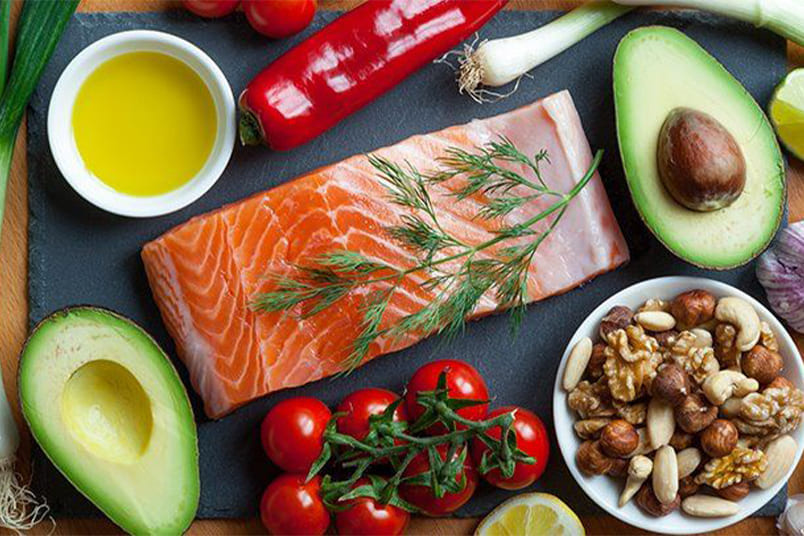Blog > Nutritional Approaches to Improve Male Fertility: Diet and Supplements
Nutritional Approaches to Improve Male Fertility: Diet and Supplements

Nutrition significantly influences male fertility by providing essential elements necessary for hormonal balance, sperm production, and function. A balanced diet rich in vitamins, minerals, and antioxidants supports optimal sperm health. Nutrients such as omega-3 fatty acids, zinc, folate, and vitamin B12 positively impact sperm quality and DNA synthesis. Antioxidant-rich foods combat oxidative stress, protecting sperm from damage. Maintaining a healthy body weight, moderating caffeine and alcohol intake, and minimizing exposure to toxins further contribute to enhanced fertility. Maintaining these nutritional principles, alongside a healthy lifestyle, promotes overall reproductive well-being in men.
Diets and Male Fertility

There is increased evidence that dietary behaviours in men have been linked to sperm quality parameters. The following are the various diets and how they affect male fertility:
Mediterranean Diet and Male Fertility
The Mediterranean diet, characterized by abundant fruits, vegetables, whole grains, fish, and olive oil, has been associated with a positive impact on male fertility. Rich in antioxidants, vitamins, and omega-3 fatty acids, this diet supports sperm health. Olive oil, a staple, contains monounsaturated fats linked to improved sperm morphology. Additionally, the abundance of fruits and vegetables provides essential vitamins and antioxidants, countering oxidative stress and promoting DNA integrity. The emphasis on lean proteins, particularly fish, contributes to omega-3 fatty acids, enhancing sperm motility. Overall, the Mediterranean diet aligns with key nutritional factors necessary for male reproductive health.
Western Diet and Its Impact on Male Fertility
The Western diet, characterized by a high intake of processed foods, red meat, saturated fats, and sugary beverages, has been associated with adverse effects on male fertility. Elevated saturated fat consumption is associated with reduced sperm motility and concentration. Processed foods often lack essential nutrients and antioxidants, contributing to oxidative stress and potential DNA damage in sperm. Excessive calorie intake leading to obesity is prevalent in this diet and is associated with hormonal imbalances and compromised sperm quality. High sugar intake has been linked to insulin resistance, further impacting reproductive health. The Western diet, therefore, poses challenges to male fertility due to its nutrient-poor nature and contribution to obesity-related complications.
Vegetarian Diet and Considerations for Male Fertility
A vegetarian diet, rich in plant-based foods and devoid of meat, can positively impact male fertility but requires careful consideration. While plant-based diets are typically rich in antioxidants, fibre, and phytonutrients, certain nutrients important for male reproductive health, such as vitamin B12, zinc, and omega-3 fatty acids, are predominantly found in animal products.
Implications of Nutrients on Male Fertility

Male fertility is linked to nutrition, with various nutrients playing vital roles in sperm production, motility, and overall reproductive health. The following section delves into the implications of specific nutrients and dietary patterns on male fertility:
Essential Nutrients for Sperm Health
Zinc: Zinc is a key mineral essential for spermatogenesis and testosterone production. Its deficiency is associated with reduced sperm quality and infertility. Foods rich in zinc, such as lean meats, dairy, and nuts, should be included to support optimal reproductive function.
Omega-3 Fatty Acids: Omega-3 fatty acids, found in fatty fish, flaxseeds, and walnuts, contribute to sperm membrane fluidity and integrity. Their incorporation into the diet positively influences sperm motility, potentially enhancing fertility.
Antioxidants: Antioxidants, including vitamins C and E, selenium, and beta-carotene, protect sperm from oxidative stress. Berries, nuts, and green tea, rich in these antioxidants, contribute to sperm DNA integrity, reducing the risk of genetic abnormalities.
Folate and Vitamin B12: Folate and vitamin B12 are crucial for DNA synthesis and replication. Inadequate levels of these vitamins may lead to sperm chromosomal abnormalities. Leafy greens, legumes, fish, and meat are dietary sources that support the availability of folate and vitamin B12.
Selenium: Selenium is an important trace element that plays a vital role in maintaining optimal sperm health. It acts as an antioxidant, protecting sperm cells from oxidative damage, and is essential for sperm motility and function. Selenium also contributes to the formation of DNA in developing sperm, supporting genetic integrity. Include selenium-rich foods in your diet, such as Brazil nuts, fish (tuna, halibut), sunflower seeds, and poultry.
Vitamin D: Vitamin D plays a crucial role in sperm health by influencing sperm motility and overall function. Adequate vitamin D levels contribute to enhanced sperm motility and may positively impact fertility. Moreover, vitamin D is associated with the regulation of testosterone, a key hormone for sperm production. Insufficient vitamin D has been linked to decreased sperm quality, emphasizing the importance of maintaining optimal levels for overall male reproductive well-being. Dairy and plant milks fortified with vitamin D, salmon, tuna, and swordfish are rich sources of vitamin D.
Hydration: Proper hydration is vital for maintaining semen volume. Dehydration can lead to concentrated semen, affecting sperm motility. Maintaining adequate water intake is a simple yet essential aspect of supporting male reproductive health.
Body Weight and Male Fertility

Obesity: Obesity is linked to hormonal imbalances and reduced sperm quality. Adipose tissue can harbour excess estrogen, disrupting the delicate hormonal interplay necessary for proper reproductive function. A balanced diet and regular exercise are crucial for maintaining a healthy weight and supporting fertility.
Underweight: Insufficient body weight can also impact fertility, causing irregularities in hormone production. A diet rich in nutrients, coupled with appropriate calorie intake, helps address underweight-related fertility challenges.
Lifestyle Factors and Male Fertility

Caffeine and Alcohol: Excessive caffeine and alcohol intake have been associated with decreased sperm quality. Moderation is key, as limiting these substances can positively influence sperm parameters and overall reproductive health.
Smoking and Environmental Toxins: Smoking and exposure to environmental toxins can harm sperm DNA and reduce fertility. Diets rich in antioxidants may counteract some of these negative effects, necessitating the importance of a holistic approach to male reproductive health.
Psychological Factors Impacting Nutrition and Male Fertility

Psychological factors such as stress, anxiety, and depression can influence nutritional choices, impacting male fertility. Stress-induced behaviours, such as emotional eating or avoidance of balanced meals, may lead to nutrient deficiencies that are necessary for reproductive health. Additionally, mental health conditions can disrupt hormonal balance, affecting sperm production and function. The following are the various ways to maintain a holistic well-being:
- Mindful Eating: Practice mindful eating to enhance awareness of nutritional choices and prevent stress-related unhealthy eating patterns.
- Stress Management: Incorporate stress-reducing techniques such as meditation, yoga, or regular exercise to mitigate the impact of psychological stress on dietary habits and hormonal balance.
- Professional Support: Consultation with a healthcare professional or nutritionist can provide personalized strategies to address psychological influences on nutrition and enhance male fertility. A holistic approach that addresses both psychological and nutritional aspects is key to promoting optimal reproductive health.
In summary, nutrition exerts a profound influence on male fertility, affecting sperm quality, hormonal balance, and overall reproductive health. A well-rounded diet, rich in essential nutrients and antioxidants, coupled with a healthy lifestyle, can significantly contribute to optimizing male fertility. Understanding these implications provides a foundation for personalized dietary strategies and lifestyle modifications to support men in their journey towards enhanced reproductive well-being.
AndroNeo, in Bangalore, India, stands as a premier destination for male fertility solutions, offering comprehensive approaches. With a focus on personalized nutrition plans and tailored treatments, they address the complex relationship between nutrition and reproductive health. Recognized for their expertise, AndroNeo Hospital is committed to optimizing male fertility through innovative strategies, ensuring individuals receive top-notch care for achieving their family goals.
Related Post
Penile Implant Surgery: A Permanent Solution to Erectile Dysfunction from the expert Andrologist in Bangalore
Penile Implant Surgery: A Permanent Solution to Erectile Dysfunction from the expert Andrologist in Bangalore Living with erectile dysfunction (ED) is not only a physical
Testosterone – why is it so important
Testosterone – why is it so important Testosterone hormone is one of the most important hormones in our body, it is primarily a male hormone
Bengaluru’s Leading Expert in Andrology (Male Fertility and Sexual Health) and Prosthetic Urology – Dr Pramod Krishnappa
Bengaluru’s Leading Expert in Andrology (Male Fertility and Sexual Health) and Prosthetic Urology – Dr Pramod Krishnappa Overview Dr. Pramod Krishnappa is an exceptional Andrology
Varicocele – The Hidden Cause of Male Infertility
Varicocele_ The Hidden Cause of Male Infertility Infertility in men is a problem for millions of couples around the world, and one of the common
No Sperm and Its Link to Genetic Factors: An Exploratory Guide
No Sperm and Its Link to Genetic Factors: An Exploratory Guide Azoospermia, a leading cause of male infertility, occurs when a man’s ejaculate (semen) does
Penile Implant For Erectile Dysfunction: Preparation, During & After Surgery
Penile Implant For Erectile Dysfunction: Preparation, During & After Surgery A penile implant, also called a penile prosthesis, is a treatment method used to treat
Author: Dr. Pramod Krishnappa
